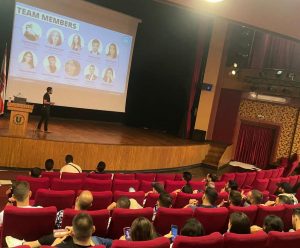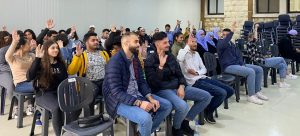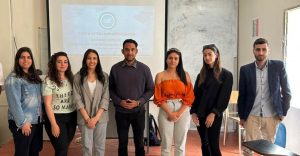Written by Ramon Rahangmetan
Reading time: 5 minutes
Role of Leadership for Sustainable Development
The topic of responsible leadership plays a significant role in sustainable development, to specify; it involves guiding and driving initiatives, actions and policies that balance economic growth, environmental stewardship, and social well-being as its main triangle for overall development. Responsible leaders engage and discuss these with various stakeholders and local communities, listening to their concerns, and most importantly involving them in the decision-making processes so that their needs are being heard and are able to do something about it. Responsible leaders understand that sustainable development cannot be achieved without considering the needs, aspirations, and well-being of all people affected by it. Along with their own ability to be able to communicate, influence and inspire others to follow their cause and keep striving for its objectives.

Students from Lebanese University Sagesse – Beirut
Series of Workshops
From 8-12 May 2023; Circle of Sustainable Europe (CoSE) organized a series of workshops in Lebanon in partnership with various student councils from renowned universities to; inspire, educate and activate youth in their participation in Lebanese society and to give them a glimpse of leadership frameworks in sustainable development. The series of workshops were about; leadership skills, art of networking and sustainable finance in various places in this middle-eastern country, as the country has a wide history of being colonized by many empires thoughout history before their independence from France in 1943. As of currently, this state is in an economic, social and environmental crisis and lack of consistent responsible leadership for youth, which took its toll after the Beirut blast in 2020, as of today, no accountability has been claimed for the blast.
The series workshops were held on a voluntarily basis at the University of Balamand – Souk El Gharb, the Modern University for Science and Business – Aley, the Lebanese American University, the American University of Beirut, the Lebanese International University, and the University of Sagesse. Students were eager to learn more about the topic, as they viewed it as very interactive, engaging and motivating to be part of this series of workshops.

Modern University for Science and Business (MUBS), Aley, Mount Lebanon – Workshop
Online Youth Training
As a follow-up, we invited the students to be part of an online certified youth training event that will be held in June 2023 called Leadership in the 21st Century which subtopics will be discussed during the online event;
- Competences for personal development in society; political literacy, career skills and networking
- Discussing first project survey results amongst youths from all partners of the project
- Parliamentary simulation conference plan announcement in Antalya, Turkey

Certificate after completion workshops
As today’s youth encompass a large proportion of the decision-makers of the future on various countries, including Lebanon, it’s important to know on what type of leadership their decisions are based upon. However, although the young population between the ages of 18-30 constitutes a significant part of the society in many European countries, the number of seats in the national parliaments for young people is quite low compared to the total population.
Therefore, young people have a need to make their voices heard; and, youth’s problem of representation, problem of understanding of political literacy and their access to decision-making mechanisms should be facilitated. In Europe the participation of youth leadership in political life and civil society is vital to achieve the 2050 Carbon Neutral Europe target. The sustainability of this target can be ensured by raising the awareness of young people about political literacy, leadership skills, art of networking, sustainable finance, democratic participation and decision-making processes. Which were all part of this series of workshops and online training combined with our ongoing European Erasmus+ projects.

Students from Lebanese University
The general objective of this long-term project is to make young people willing to participate actively in civil society and political life at local, national, and European scales. However, for young people to be willing to participate, they need to learn and experience how to become more knowledgeable, conscious, and active. Also, many sessions will be held in the form of parliamentary simulations later on next year. These simulations will be held with non-formal learning methodologies. Young people should be encouraged to act as decision makers, policy makers, policy implementers and will discuss how they can be united towards the goal of a carbon neutral European continent by 2050.

